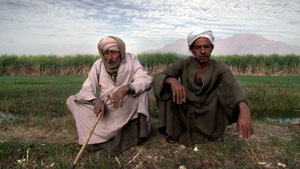‘Timbuktu’ and other relevant African films at IFFR
This year, the African films at the International Film Festival in Rotterdam (21 Januari- 1 Februari 2015) were mostly short films, some of them put together under the theme of 'Urban Africa'. However, of the few feature films that were selected, one really merits to be seen by a lot more people than those that visit the IFRI: ‘Timbuktu’.
 'Timbuktu' sadly is a very relevant film, about the disruption of the lives of the inhabitants of the city of Timbuktu in Northern Mali by armed groups of radical Muslims, which took place in the summer of 2012.
'Timbuktu' sadly is a very relevant film, about the disruption of the lives of the inhabitants of the city of Timbuktu in Northern Mali by armed groups of radical Muslims, which took place in the summer of 2012.
Kidane, his family and young shepherd Issan live just outside Timbuktu, which has recently fallen into the hands of fundamentalists; playing music, laughing, smoking and football are forbidden. Women have no rights whatsoever, and the law of the Sharia has been imposed. Then Kidane accidentally kills a fisherman who had slaughtered his beloved cow. His fate is now in the hands of the Jihadists.
Director Abderrahmane Sissako, himself a Muslim, born in Mauritania but raised in Mali, felt he had to make this film because the hardships of the local people in the grip of the jihadists hardly received any media attention. He sketches a balanced picture of the situation, showing how both Tuareg and Bambara people are the victims of men with radical ideas, at the same time also showing the humanity in the jihadists, who have difficulty in abiding by their own harsh laws. The occasional gruesome scenes are followed by dreamlike ones, like the boys playing football without a ball. The film is beautifully photographed, featuring beautiful music from for example singer Fatoumata Diawara, who also plays a role in the film.
 Another surprising film is 'Things of the Aimless Wanderer' by Kivu Ruhorahoza. This young Rwandese filmmaker directed the surprisingly styled film 'Matière Grise' (2011) about the psychological impact of the genocide of 1994 on a brother and sister whose parents were murdered but who had to go on with their lives. His new film has a powerful visual narrative style and an experimental electronic score. The aimless wanderer of the title is a white man making an African travelogue. He meets a local girl who soon disappears and he decides to investigate. Little by little, fear and paranoia overcome him.
Another surprising film is 'Things of the Aimless Wanderer' by Kivu Ruhorahoza. This young Rwandese filmmaker directed the surprisingly styled film 'Matière Grise' (2011) about the psychological impact of the genocide of 1994 on a brother and sister whose parents were murdered but who had to go on with their lives. His new film has a powerful visual narrative style and an experimental electronic score. The aimless wanderer of the title is a white man making an African travelogue. He meets a local girl who soon disappears and he decides to investigate. Little by little, fear and paranoia overcome him.
 'Je suis le peuple', by Anna Roussillon, is a wonderful documentary that assesses the impact of the 2011 revolution, demonstrations, and subsequent elections in Egypt on the people living in the countryside. Strictly speaking this is not really an 'African film' because the director was born in Lebanon and later moved to France. However, Roussillon grew up in Cairo and speaks fluently Arabic. For three years she closely followed a family living in a village in southern Egypt near Luxor. They and their fellow inhabitants tell her very openly about their views on politics, hope for the future and final disappointment. Because in everyday life, very little changes.
'Je suis le peuple', by Anna Roussillon, is a wonderful documentary that assesses the impact of the 2011 revolution, demonstrations, and subsequent elections in Egypt on the people living in the countryside. Strictly speaking this is not really an 'African film' because the director was born in Lebanon and later moved to France. However, Roussillon grew up in Cairo and speaks fluently Arabic. For three years she closely followed a family living in a village in southern Egypt near Luxor. They and their fellow inhabitants tell her very openly about their views on politics, hope for the future and final disappointment. Because in everyday life, very little changes.
Hopefully next year's edition of IFFR will screen some more African films, because they are there!
Elvire Eijkman

